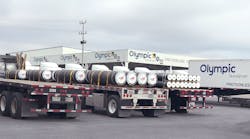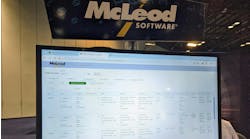PUERTO VALLARTA, Mexico. Olympic Transport was the first Mexican fleet to earn certification to deliver freight directly into the United States and Canada as part of the North American Free Trade Agreement (NAFTA) pilot program.
Owner and CEO Fernando Paez said while some other fleets may have balked at the long list of requirements to qualify for the program, for Olympic it was just part of doing business.
“Requirements need to be met” to operate in the United States, regardless of where the truck is based,” he said through an interpreter at an event hosted by Daimler Commercial Vehicles Mexico.
He shared with a clear sense of pride the story of how a truck owned by Olympic was inspected alongside one from a U.S.-based fleet, and inspectors were unable to tell the difference between the two.
Paez speaks English, but answered questions in Spanish, since there were members of the media from the United States, Canada, and Mexico in attendance.
The language barrier is the first element of the training truck drivers for Olympic receive, Paez said. The company has two full-time trainers, with one focused on assessing “the level of English this operator has,” Paez said.
If required, drivers are provided English-language tutoring and receive lengthy training so they are prepared to interact with any inspector or law enforcement official in the United States.
"If we haven’t given him the right training, he is going to feel intimidated,” Paez said.
Olympic teaches drivers to answer respectfully, using terms like “yes sir” in their responses, and to make direct eye contact.
Drivers undergo simulations with instructors to simulate what they may encounter at border crossings or inspections.
“We want him to feel that pressure,” Paez stressed, so that drivers will know how to respond to a real inspection.
Paez’s trucking journey started in the mid-1980s, when he traveled to the United States and came back with a 1985 Freightliner truck. Today, Olympic Transport has 140 trucks, 175 employees, and relies on cross-border trade for about 95% of its business.




